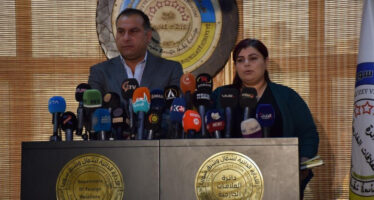ICG: Kurdish question would be solved through dialogue not war
![]()

International Crisis Group says a solution to the Kurdish issue can only lie in advancing the constitutional, language and legal reforms
According to a new report (you can downoad it here) by the Brussels-based think-tank International Crisis Group (ICG) a solution to the Kurdish issue can only lie in advancing the constitutional, language and legal reforms of the past decade that have gone part way to giving Turkish Kurds equal rights.
The group points out that “a hot war and militaristic tactics did not solve the Kurdish problem in the 1990s and will not now”.
Of course entering the path of reforms means that all of the parties involved in the conflict should take steps, adds ICG. And in the report recommendation it points out that “the PKK must immediately end” its new wave of attacks, and “the Turkish authorities must control the escalation with the aim to halt all violence”.
The group also says that “the Turkish authorities must implement radical judicial, social and political measures that persuade all Turkish Kurds they are fully respected citizens. They should reach out to non-violent nationalists and not abandon long-standing negotiations on disarmament with the PKK, including its jailed leader, Abdullah Öcalan”.
On its part the the Kurdish movement according to the recommendation of the ICG “must firmly commit to a legal, non-violent struggle within Turkey, and its elected representatives must take up their seats in parliament, the only place to shape the country-wide reforms that can give Turkish Kurds long-denied universal rights”.
Offering a questionable reading of why the so called government’s “Democratic Opening” did not deliver as expected, the group acknowledges that “while making these reforms, the authorities have arrested hundreds of Turkish Kurd nationalists, including many elected municipal officials and other nationalist party members. More than 3,000 nationalist activists are behind bars, many punished as “terrorists” for the non-violent expression of opinions under laws for which the AKP is responsible” but arguably blames the Kurdish movement for the government’s failing in delivering an amnesty. “On the other hand, – ICG says – what should have been the centrepiece of the Democratic Opening – a ground-breaking PKK amnesty in October 2009 – foundered when Turkish Kurd nationalists exploited it for propaganda purposes”. Clearly this was not the case as an amnesty was hardly on the AKP’s agenda.
Assessing the role of the international community, the report points out that now it is only playing only indirect roles in this conflict. It does urge Turkey to understand that it “will be unable to present itself credibly as the regional democratic standard bearer if it chooses military means alone to try to solve its Kurdish problem. Alongside legitimate security measures, it must fully satisfy the universal human rights of its Turkish Kurd citizens”.
Related Articles
Autonomous Administration assessed latest developments
![]()
The Autonomous Administration of North and East Syria Executive Council co-presidents Abdulhamid El Mihbaş and Bêrîvan Xalid held a press
¿Quién dijo Kurdistán?
![]()
Los kurdos en la “primavera árabe” Alejandro Haddad Rebelión El pasado jueves 26 de julio la cúpula del gobierno turco
Kurds in Turkey: arrests and violence threaten to radicalise a generation
![]()
Constanze Letsch reports on the Turkish crackdown on the country’s Kurds and the cultural oppression that goes with itConstanze Letsch in



